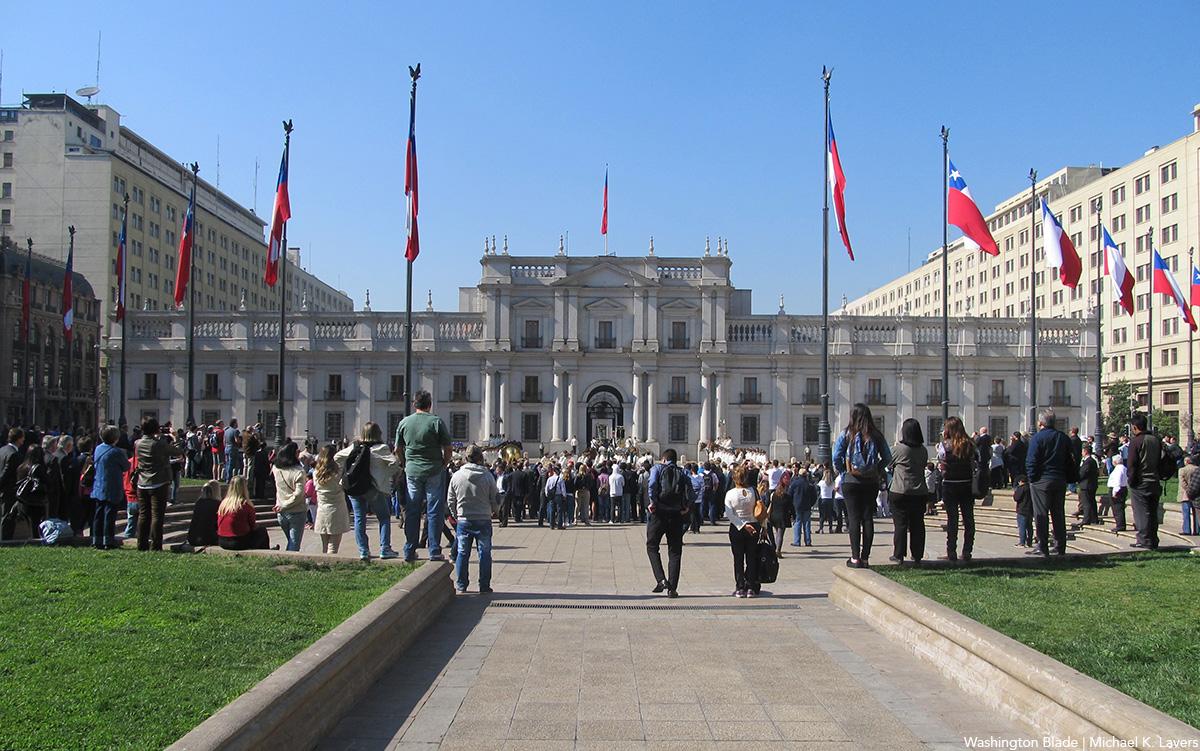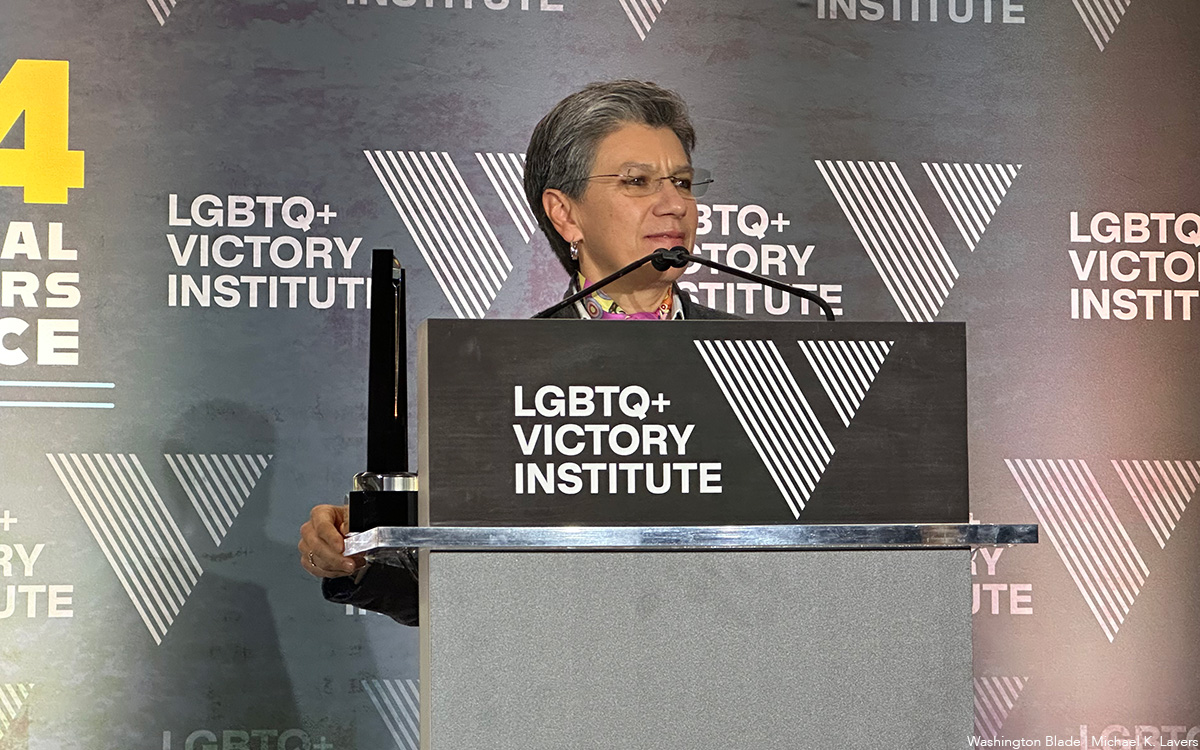South America
Chilean government urged to promote comprehensive sex education bill
Advocacy group sent request to Education Minister Claudio Cataldo

A Chilean advocacy group has submitted an urgent request to Education Minister Claudio Cataldo that urges President Gabriel Boric’s government to promote a comprehensive sex education bill.
The Movement for Homosexual Integration and Liberation asserts the implementation of a comprehensive sex education curriculum is essential to ensuring all students, regardless of their sexual orientation or gender identity, have access to an inclusive education without discrimination. The group also argues inclusive guidelines are crucial to promoting sexual and reproductive health and preventing gender-based violence and bullying.
“We met with the minister of education to ask him to promote a comprehensive sexual education bill, since it is of utmost importance that children and adolescents have this type of education,” Movilh spokesperson Javiera Zuñiga told the Washington Blade. “In addition, there is a commitment on the part of the state of Chile that was acquired in the Friendly Settlement Agreement before the Inter-American Commission on Human Rights for the demand of equal marriage, where the State commits itself to generate education policies.”
Zuñiga explained that “comprehensive sex education addresses several issues that are not dealt with in Chile today, which have to do not only with sexual orientation or gender identity, but also often have to do with knowing the body, being able to have tools to deal with abuse and also to know about sexually transmitted diseases. It is a wide range of topics that our children and adolescents today do not have access to know.”
The request comes at a crucial moment amid the ongoing debate over sex education in Chile.
The lack of a comprehensive policy has generated concern among various sectors of society, especially among LGBTQ organizations and human rights activists who have pointed out the urgent need to implement concrete measures to address this issue.
Faced with this new debate, Emilia Schneider, the country’s first transgender member of Congress, told the Blade she thinks “it is very good that Movilh joins many organizations that have been demanding and working for CSE (comprehensive sex education) for years in Chile.” These groups include Apofa, the Feminist Teachers Network and Chile Necesita CSE.
“I believe that their request is correct in the sense that comprehensive sexual education is necessary and is demanded by the educational communities themselves,” said Schneider.
Cataldo in response to Movilh’s request has expressed his willingness to dialogue and collaborate in the elaboration of a comprehensive bill. The government has yet to announce any concrete measures it plans to take to advance it.
Schneider explained that “for me CSE is a central issue, it has always been and I have been working for it for years.”
“Of course, my commitment remains intact,” she said. “There are already many bills on comprehensive sex education, which shows that it is a long debate that is still open in Chile. There is even a bill that (former President Sebastián Piñera)’s education minister, Marcela Cubillos, presented, and one from Republicans. I would call on the different sectors to sit down and reach an agreement once and for all before sending me an individual (bill.)”
Organizing Trans Diversities President Ignacia Oyarzún told the Blade that “all the needs we have as a community are urgent and are a priority and unfortunately all these urgencies are for yesterday.”
“We are talking about laws and regulations that protect the human rights of a community that has been historically violated,” said Oyarzún. “We are talking about a community that has been exterminated throughout history, both by society and by regulations. So we are talking about a community that deserves special protection”.
With regard to eventual support for this bill in Congress, Schneider pointed out that “unfortunately, the scenario for the CSE is very difficult.”
“That is why we have to be very strategic in order to move forward,” she said. “There is an international organization of the ultra-right to prevent us from advancing in this very important right, organizations such as Con Mis Hijos No Te Metas in other countries have even been associated with serious cases of child abuse. One wonders who they are defending. Either they are with the children and youth who are safer and protected with information and accompaniment or they are on the side of the abusers.”
“I hope there is a majority that understands that we can reach agreements to move forward, especially because the CSE is something that is constantly demanded by the educational communities,” added Schneider. “This does not exist today, and that is why we need a lot of capacity for dialogue and drive to build it, but above all to go out to do a lot of pedagogy and explain to the population its importance, especially to prevent and combat child sexual abuse.”
Oyarzún said “we believe that if we leave aside the more ideological issues and concentrate on what is really important, which are these children and adolescents, we could have a significant advance in Congress.”
Colombia
Colombians protest against Trump after he threatened country’s president
Tens of thousands protested the US president in Bogotá

BOGOTÁ, Colombia — Tens of thousands of people on Wednesday gathered in the Colombian capital to protest against President Donald Trump after he threatened Colombian President Gustavo Petro.
The protesters who gathered in Plaza Bolívar in Bogotá held signs that read, among other things, “Yankees go home” and “Petro is not alone.” Petro is among those who spoke.
The Bogotá protest took place four days after American forces seized now former Venezuelan President Nicolás Maduro and his wife, Cilia Flores, at their home in Caracas, the Venezuelan capital, during an overnight operation.
The Venezuelan National Assembly on Sunday swore in Delcy Rodríguez, who was Maduro’s vice president, as the country’s acting president. Maduro and Flores on Monday pleaded not guilty to federal drug charges in New York.
Trump on Sunday suggested the U.S. will target Petro, a former Bogotá mayor and senator who was once a member of the M-19 guerrilla movement that disbanded in the 1990s. Claudia López, a former senator who would become the country’s first female and first lesbian president if she wins Colombia’s presidential election that will take place later this year, is among those who criticized Trump’s comments.
The Bogotá protest is among hundreds against Trump that took place across Colombia on Wednesday.
Petro on Wednesday night said he and Trump spoke on the phone. Trump in a Truth Social post confirmed he and his Colombian counterpart had spoken.
“It was a great honor to speak with the president of Colombia, Gustavo Petro, who called to explain the situation of drugs and other disagreements that we have had,” wrote Trump. “I appreciated his call and tone, and look forward to meeting him in the near future. Arrangements are being made between Secretary of State Marco Rubio and the foreign minister of Colombia. The meeting will take place in the White House in Washington, D.C.”

Colombia
Gay Venezuelan man who fled to Colombia uncertain about homeland’s future
Heberth Aguirre left Maracaibo in 2018

BOGOTÁ, Colombia — A gay Venezuelan man who has lived in Colombia since 2018 says he feels uncertain about his homeland’s future after the U.S. seized now former Venezuelan President Nicolás Maduro.
“On one hand I can feel happy, but on the other hand I feel very concerned,” Heberth Aguirre told the Washington Blade on Tuesday during an interview at a shopping mall in Bogotá, the Colombian capital.
Aguirre, 35, is from Maracaibo, Venezuela’s second-largest city that is the heart of the country’s oil industry.
He developed cultural and art initiatives for the Zulia State government.
“Little by little, I suddenly became involved in politics because, in a way, you had to be involved,” recalled Aguirre. “It was necessary to be involved because the regime often said so.”
“I basically felt like I was working for the citizens, but with this deeply ingrained rule we had to be on their side, on the side of the Maduro and (former President Hugo) Chávez regime,” he added.
Maduro in 2013 became Venezuela’s president after Chávez died.
“There are things I don’t support about the regime,” Aguirre told the Blade. “There are other things that were nice in theory, but it turned out that they didn’t work when we put them into practice.”
Aguirre noted the Maduro government implemented “a lot of laws.” He also said he and other LGBTQ Venezuelans didn’t “have any kind of guarantee for our lives in general.”
“That also exposed you in a way,” said Aguirre. “You felt somewhat protected by working with them (the government), but it wasn’t entirely true.”
Aguirre, 35, studied graphic design at the University of Zulia in Maracaibo. He said he eventually withdrew after soldiers, members of Venezuela’s Bolivarian National Guard, and police officers opened fire on students.
“That happened many times, to the point where I said I couldn’t keep risking my life,” Aguirre told the Blade. “It hurt me to see what was happening, and it hurt me to have lost my place at the university.”
Venezuela’s economic crisis and increased insecurity prompted Aguirre to leave the country in 2018. He entered Colombia at the Simón Bolívar Bridge near the city of Cúcuta in the country’s Norte de Santander Province.
“If you thought differently, they (the Venezuelan government) would come after you or make you disappear, and nobody would do anything about it,” said Aguirre in response to the Blade’s question about why he left Venezuela.
The Simón Bolívar Bridge on the Colombia-Venezuela border on May 14, 2019. (Washington Blade video by Michael K. Lavers)
Aguirre spoke with the Blade three days after American forces seized Maduro and his wife, Cilia Flores, at their home in Caracas, the Venezuelan capital, during an overnight operation.
The Venezuelan National Assembly on Sunday swore in Delcy Rodríguez, who was Maduro’s vice president, as the country’s acting president. Maduro and Flores on Monday pleaded not guilty to federal drug charges in New York.
President Donald Trump on Tuesday in a Truth Social post said Venezuela’s interim authorities “will be turning over between 30 and 50 million barrels of high quality, sanctioned oil, to the United States of America.”
“This oil will be sold at its market price, and that money will be controlled by me, as president of the United States of America, to ensure it is used to benefit the people of Venezuela and the United States,” wrote Trump.
Trump on Sunday suggested the U.S. will target Colombian President Gustavo Petro, a former Bogotá mayor and senator who was once a member of the M-19 guerrilla movement that disbanded in the 1990s.
Petro has urged Colombians to take to the streets on Wednesday and “defend national sovereignty.” Claudia López, a former senator who would become the country’s first female and first lesbian president if she wins Colombia’s presidential election that will take place later this year, is among those who criticized Trump’s comments.
“Let’s be clear: Trump doesn’t care about the humanitarian aspect,” said Aguirre when the Blade asked him about Trump. “We can’t portray him as Venezuela’s savior.”
Meanwhile, Aguirre said his relatives in Maracaibo remain afraid of what will happen in the wake of Maduro’s ouster.
“My family is honestly keeping quiet,” he said. “They don’t post anything online. They don’t go out to participate in marches or celebrations.”
“Imagine them being at the epicenter, in the eye of the hurricane,” added Aguirre. “They are right in the middle of all the problems, so it’s perfectly understandable that they don’t want to say anything.”
‘I never in my life thought I would have to emigrate’
Aguirre has built a new life in Bogotá.
He founded Mesa Distrital LGBTIQ+ de Jóvenes y Estudiantes, a group that works with migrants from Venezuela and other countries and internally placed Colombians, during the COVID-19 pandemic. Aguirre told the Blade he launched the group “with the need to contribute to the general population, not just in Colombia.”
Aguirre met his husband, an American from California, at a Bogotá church in December 2020 during a Christmas event that SDA Kinship Colombia, an LGBTQ group, organized. A Utah judge virtually officiated their wedding on July 12, 2024.
“I love Colombia, I love Bogotá,” said Aguirre. “I love everything I’ve experienced because I feel it has helped me grow.”
He once again stressed he does not know what a post-Maduro Venezuela will look like.
“As a Venezuelan, I experienced the wonders of that country,” said Aguirre. “I never in my life thought I would have to emigrate.”
The Colombian government’s Permiso por Protección Temporal program allows Aguirre and other Venezuelans who have sought refuge in Colombia to live in the country for up to 10 years. Aguirre reiterated his love for Colombia, but he told the Blade that he would like to return to Venezuela and help rebuild the country.
“I wish this would be over in five years, that we could return to our country, that we could go back and even return with more skills acquired abroad,” Aguirre told the Blade. “Many of us received training. Many of us studied a lot. We connected with organizations that formed networks, which enriched us as individuals and as professionals.”
“Returning would be wonderful,” he added. “What we’ve built abroad will almost certainly serve to enrich the country.”
Colombia
Claudia López criticizes Trump over threats against Colombian president
Presidential candidate would become country’s first lesbian head of government

BOGOTÁ, Colombia — Colombian presidential candidate Claudia López has criticized President Donald Trump after he suggested the U.S. will target Colombian President Gustavo Petro.
“Colombia is very sick, too, run by a sick man, who likes making cocaine and selling it to the United States, and he’s not going to be doing it very long,” Trump told reporters on Air Force One on Sunday.
Trump made the comments a day after American forces carried out an overnight operation and seized now former Venezuelan President Nicolás Maduro and wife, Cilia Flores, at their home in Caracas, the Venezuelan capital.
Maduro and Flores on Monday pleaded not guilty to federal drug charges in New York.
Petro is a former Bogotá mayor and senator who was once a member of the M-19 guerrilla movement that disbanded in the 1990s. He has urged Colombians to take to the streets and “defend national sovereignty.”
“Colombians are the ones who decide who governs Colombia,” said López on her X account. “President Gustavo Petro won free elections and has a constitutional mandate.”
López did not mention Trump by name in her comment.
The first-round of Colombia’s presidential election will take place on May 31. The country’s 1991 constitution prevents Petro from seeking re-election.
López in 2019 became the first woman and first lesbian elected mayor of Bogotá, the Colombian capital and the country’s largest city. She took office on Jan. 1, 2020, less than a month after she married her wife, Colombian Sen. Angélica Lozano.
“This year we will decide at the polls what direction (the country) is heading and what leadership will advance Colombia,” said López in her X post. “Supporting soft dictatorships and attacking democracies is an absurd and unacceptable political action by the United States towards Colombia, Venezuela, and Latin America.”
Quién gobierna en Colombia lo decidimos los colombianos.
El presidente @petrogustavo ganó unas elecciones libres y tiene un mandato constitucional. Este año decidiremos en las urnas qué rumbo y a cargo de qué liderazgo avanza Colombia.
Sostener dictablandas y atacar democracias… https://t.co/K61G2QUcck— Claudia López Hernández (@ClaudiaLopez) January 5, 2026
López would be Colombia’s first female president if she wins the election. López would also become the third openly lesbian woman elected head of government — Jóhanna Sigurðardóttir was Iceland’s prime minister from 2009-2013 and Ana Brnabić was Serbia’s prime minister from 2017-2024.
The LGBTQ+ Victory Institute in 2024 honored López at its annual International LGBTQ Leaders Conference in D.C. The Washington Blade interviewed her during the gathering.
-

 Sponsored5 days ago
Sponsored5 days agoSafer Ways to Pay for Online Performances and Queer Events
-

 District of Columbia4 days ago
District of Columbia4 days agoTwo pioneering gay journalists to speak at Thursday event
-

 Colombia4 days ago
Colombia4 days agoBlade travels to Colombia after U.S. forces seize Maduro in Venezuela
-

 a&e features4 days ago
a&e features4 days agoQueer highlights of the 2026 Critics Choice Awards: Aunt Gladys, that ‘Heated Rivalry’ shoutout and more




















